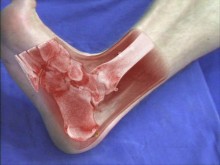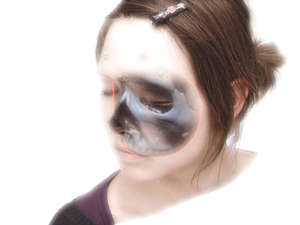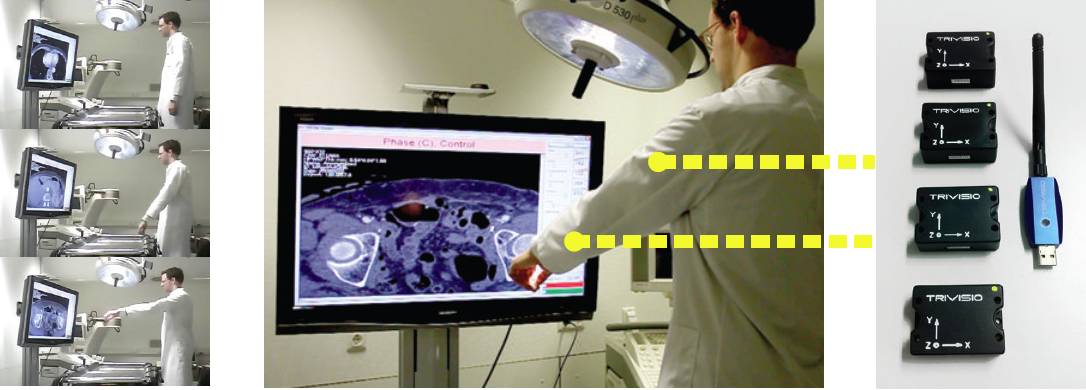Proseminar - Medical Augmented Reality und User Interfaces
Tobias Blum, Ali Bigdelou, Ralf Stauder, Nassir Navab Module: IN0013 (2 SWS, 4 ECTS Credits)Programs: Informatics (Bachelor & Diploma), Wirtschaftsinformatik/Information Systems (Bachelor), Naturwissenschaftliche Bildung (Bachelor)
Time: Monday, 16:30 - 18:30
Location: MI 03.13.010
Motivation

|

|

|
| Live AR visualization of a CT dataset on the foot of a patient | AR visualization of a CT dataset on the head of a patient | Gesture based user interface |
Requirements
In this Bachelor Seminar Course (Proseminar), each student is asked to present one topic related to medical augmented reality and user interfaces. In order to successfully complete the seminar, participants are required to:
- Present the selected subject to the other participants (30 minutes, followed by a short discussion).
- Submit a written report (10 pages content maximum), typeset in LaTeX, and participate in the reviewing process
- Attend all seminar sessions and participate.
Each presentation is followed by a discussion and everyone is encouraged to actively participate. The report must include all references used and must be written completely in your own words.
Schedule
Open & Reserved Topics
you can also propose your own topic- History of medical AR
- AR Display devices
- AR for training and education in medicine
- Perception in medical AR
- Computer Graphics for Medical AR
- Tracking technologies
- Stereo displays
- Human Skeleton Tracking for User Interfaces
- Speech recognition in the OR
- User interfaces for 3D interaction
- Treatment of phobias using AR/VR
- Software Architectures and Frameworks for Multi-modal User Interaction
- Usability Evaluations for Augmented Reality Applications
- Gesture-based interaction using Kinect
- Gesture-based interaction using Inertial Sensors
- Gesture-based interaction using Gloves
- Interactive 3D Graphics using Multitouch Screens
- Interactions with Large Displays
- Layout of items in video walls and large displays
Essay/Talk
Presentation (about 30-45min) followed by a discussion. Essay (10 pages) including all references used. The essay and presentation have to be done in English for Hauptseminars and German or English for Proseminars. The essay must be written in your own words and not by copy and paste. For Windows users:- install miktex - TeX implementation for Microsoft Windows
- install TeXnicCenter - integrated development environment (IDE) for developing LaTeX-documents on Microsoft Windows
- Use the The Not So Short Introduction to LaTex to get started with LaTex.
- Use this latex template for the essay.
- Please use this PPT template.
- How to Present a Paper in Theoretical Computer Science: A Speaker's Guide for Students by Ian Parberry
- The outline should be sent to the supervisor four weeks before the presentation.
- The presentation slides and essay should be finalized and discussed with the supervisor one week before the presentation.
- The essay is due at the day of the last presentation of the seminar.
Literature and Helpful Links
A lot of scientific publications can be found online. The following list may help you to find some further information on your particular topic:- Microsoft Academic Search
- Google Scholar
- CiteSeer
- CiteULike
- Collection of Computer Science Bibliographies
- ScienceDirect (Elsevier Journals)
- IEEE Journals
- ACM Digital Library
- http://rzblx1.uni-regensburg.de/ezeit/ (Elektronische Zeitschriften Bibliothek)
- Verbundkatalog des Bibliotheksverbundes Bayern (BVB)
- Computer ORG
- http://www.ub.tum.de/ (TUM Library)
- To get access onto the electronic library, see http://www.ub.tum.de/medien/ejournals/readme.html
- "proxy.biblio.tu-muenchen.de" mit Port 8080 (nur fuer http). Damit klappen zumindest portal.acm.org und computer.org meistens
- Various proceedings of conferences in our AR-Lab, 03.13.036 (These proceedings are not for lending!)
- JabRef is a Java program for comfortable working with Bibtex literature databases. Handy feature: if you know the PubMed ID for an article, JabRef can import data from there (via "Web Search/Medline").
- Mendeley is a cross-platform program for organising your references.
| TeachingForm | |
|---|---|
| Title: | Medical Augmented Reality und User Interfaces |
| Professor: | Prof. Dr. Nassir Navab |
| Tutors: | Tobias Blum, Ali Bigdelou, Ralf Stauder |
| Type: | Proseminar |
| Information: | 2 SWS, 4 ECTS Credits (Module IN0013) |
| Term: | 2012SoSe |
| Abstract: | Augmented Reality (AR) is a research topic that is currently obtaining a lot of attention and media coverage. While the current AR hype is mainly due to AR on mobile devices, there is a long history of AR applications for industrial and medical use. Especially in the medical domain, the idea of using AR to have a "x-ray"-view into the patient e.g. during a running surgery is very appealing and would bring a lot of benefits to surgeons. In this seminar the most important technologies, issues and applications of medical AR are covered. Different display and tracking technologies, issues like registration and depth perception and a range of applications will be discussed in detail. Another related topic is user interfaces for medical applications. There is an increasing number of devices and information in the OR. On one side this has a lot of advantages for the surgeon, on the other side the surgeon has to handle many devices and has to process all the information. Furthermore interaction with devices is difficult as the surgeon has to be sterile and can not use mouse and keyboard. So there is an increasing interest in novel user interfaces using e.g. gestures. |
